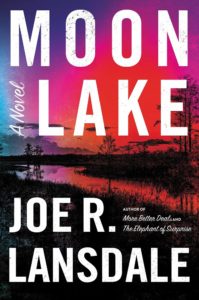 I’ve been a Joe R. Lansdale fan since … well, not quite the beginning of his career, but pretty close. I remember picking up his groundbreaking weird western Dead in the West at a Fangoria Weekend of Horrors around 1986, and that wasn’t long after he burst onto the scene with his brutal horror novel Act of Love. Later, working for a bookstore in southern California in the early nineties, I discovered (and devoured) his down-n-dirty paperbacks Cold in July, Savage Season, and, of course, The Drive-In 1 and The Drive-In 2. After those outrageous cult classics, I was hooked for life. You should see my library shelves today: They hold an awesome assortment of Lansdale’s work, which now spans not only genres but also decades. He’s been knocking them out of the park for forty years, and now he’s one of the most decorated crime writers in history, with such memorable and legendary titles as Mucho Mojo, the Hap and Leonard series, The Magic Wagon, Freezer Burn, The Bottoms, not to mention scads of sharply observed short stories.
I’ve been a Joe R. Lansdale fan since … well, not quite the beginning of his career, but pretty close. I remember picking up his groundbreaking weird western Dead in the West at a Fangoria Weekend of Horrors around 1986, and that wasn’t long after he burst onto the scene with his brutal horror novel Act of Love. Later, working for a bookstore in southern California in the early nineties, I discovered (and devoured) his down-n-dirty paperbacks Cold in July, Savage Season, and, of course, The Drive-In 1 and The Drive-In 2. After those outrageous cult classics, I was hooked for life. You should see my library shelves today: They hold an awesome assortment of Lansdale’s work, which now spans not only genres but also decades. He’s been knocking them out of the park for forty years, and now he’s one of the most decorated crime writers in history, with such memorable and legendary titles as Mucho Mojo, the Hap and Leonard series, The Magic Wagon, Freezer Burn, The Bottoms, not to mention scads of sharply observed short stories.
What’s that you say? You’ve never read him? Say it ain’t so! At any rate, you’re in luck, because Moon Lake is just coming out, and it’s pretty representative of his stuff.
The thing about Lansdale is his voice. He’s so irresistible because every time you immerse yourself into a new Lansdale yarn, you know you’re going to be transported into his own fascinatingly peculiar tone, that easy drawl, whether it’s embedded in a sweaty east-Texas crime yarn, or thrumming inside a supernatural western, or serving a high-flying fantasy filled with talking apes and militarized dirigibles. It’s always like he’s relaxing right in front of you, telling you his story with a crooked smile and a dark twinkle in his eye.
Moon Lake is one of Lansdale’s historical standalone novels, in the vein of his previous books The Thicket and Paradise Sky. Taking place in the 1960s and 1970s, it recounts a terrible crime that scarred the young life of Daniel Russell—and his later investigation as a journalist into that same crime. Looking into what at first seems a private tragedy involving his parents, Daniel eventually uncovers a morass of evil in his hometown of New Long Lincoln, a fictional Texas town that’s home to a unique man-made lake. You can bet that Daniel’s quest for the truth involves a veritable Coen Brothers cavalcade of memorable side characters. The book’s prose is also teeming with brilliant homespun turns of phrase and regional banter, impeccably written, jumping from the page as if from Lansdale’s mouth its-ownself. And true to Lansdale’s cultural preoccupations, Moon Lake is also a potent study of race relations from a frowning 21st century perspective.
Moon Lake is a return to form for Lansdale (his previous effort, More Better Deals, didn’t completely satisfy this reader), fully harnessing that distinct voice I mentioned. This is the kind of story Lansdale excels at. Although it doesn’t quite reach the transcendent heights of a work like The Thicket (probably my favorite latter-day Lansdale), it nevertheless is very much worth your time. There’s some awful stuff that happens in this vivid tale, but the author makes the sordidness oddly approachable, pulling you into Daniel’s tale with a mixture of dread and delight.





